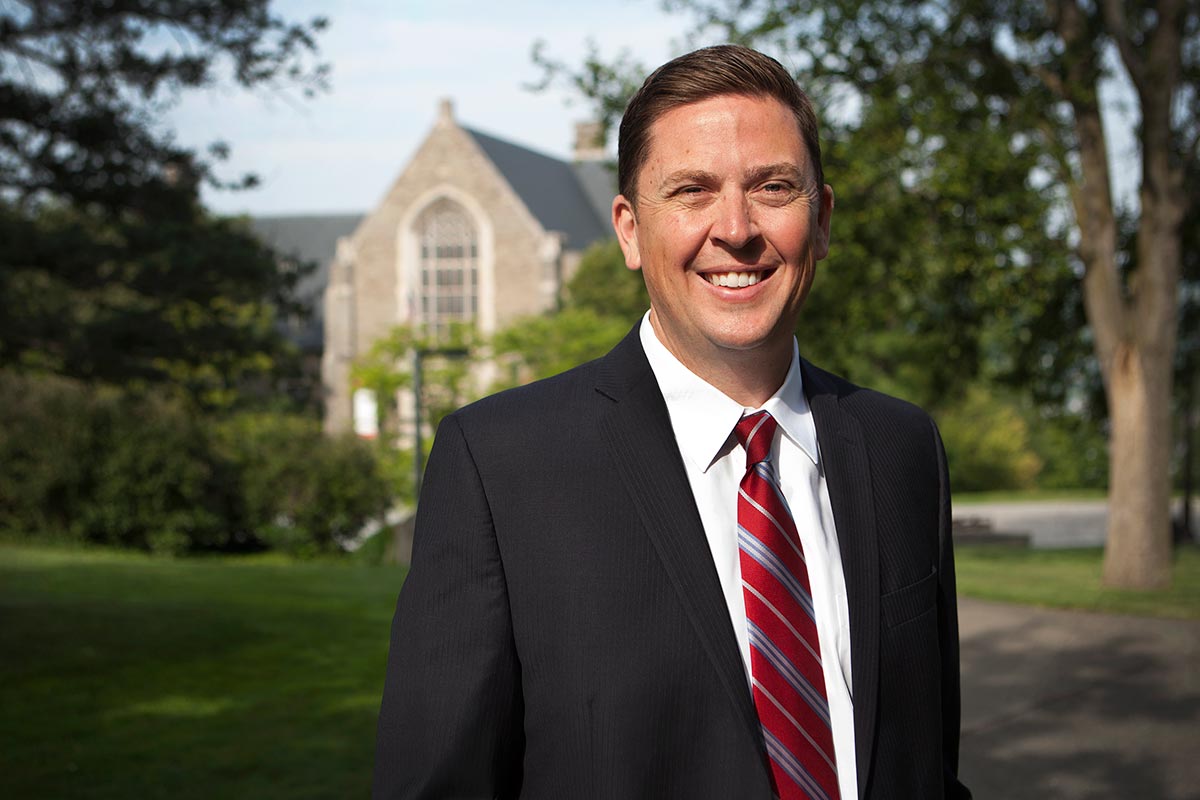Meet Ryan Lombardi, new VP for student and campus life
By Nancy Doolittle
Ryan Lombardi, vice president for student and campus life, began his tenure at Cornell Aug. 1. Over the summer, he spoke with Cornell Chronicle writer Nancy Doolittle about his new role and the impact of his division on campus.

You came from Ohio and Duke universities. What attracted you to Cornell?
Cornell is a spectacular institution, and I was most impressed with the students I met during the interview process. Their passion for Cornell and their desire to enhance the student experience was evident. It will be great to work with them to achieve our mutual goals.
What’s important to you as a leader of a student-focused organization?
I believe my role as the leader of a large organization is to facilitate innovation, creativity and a positive work environment. My approach is student-centered; my style is to ask questions. It’s our job to understand the student experience fully, immerse ourselves in the student culture, and identify opportunities for moving forward.
I want all of the staff in our division to come to work every day thinking about how to support and enhance an exceptional student experience at Cornell. My sense is that I am inheriting a team that very much believes in this approach, so I’m looking forward to seeing the great things we can do together.
How does your division help students meet important challenges?
The pressures on students today are immense, and our role is to help facilitate a campus environment that supports student learning and allows them to flourish so they are prepared to face any number of challenges.
Creating a positive campus environment involves everyone – our entire division and all faculty and staff as well as students. We all need to be engaged, no matter what aspect of the student experience our work supports.
Can you share some of the thinking behind the renaming of your division from Student and Academic Services to Student and Campus Life?
I like this new name for our division for two reasons: 1) the use of both “student” and “campus” speaks to our ability to impact every individual student we encounter and support, and also emphasizes our important role in shaping the broader campus environment, and 2) “life” reminds us that our work is a constantly developing process, which requires flexibility, intentionality and a commitment to continual growth and improvement. In short, this new name highlights the integral role our work plays in the life of both the individual student and the entire campus.
How do you see yourself engaging with our students?
This has to and will occur in myriad ways, from more structured conversations to informal interactions around campus. At Ohio, I attended a lot of campus events – sports events, theater events – and I often brought my family. I expect to do that here, too. I hope students aren’t too surprised when they see me show up unexpectedly to some of their meetings or events.
Why are diversity and inclusion efforts important in higher education today?
Unfortunately we still live in a society where inequality is commonplace. Our campuses can and should be places where we model what an inclusive community can be. Historically, higher education has provided leadership on these issues, and our society needs this leadership now more than ever.
How do staff partner with students to help them find balance and well-being during college?
I prefer the word “integration” to “balance.” Balance implies that you are holding everything in perfect equilibrium, and I think that is unrealistic. Life is about prioritization, and bringing our passion and commitment to different aspects of our lives at different times.
I believe that more students today are placing value on having a certain quality in their life that allows them to be authentic and dedicate their energy to the things they are most passionate about. The staff in Student and Campus Life should serve as positive role models in this regard. We can work together with students to create an environment of resilience that supports a healthy culture.
What experience of failure helped you grow?
As a competitive musician for more than 15 years, I had to become very comfortable with failure. For as long as I can remember, I was competing for a certain seat in the ensemble, a solo in the performance or at an organized competition. You don’t always win, and I consider that a good thing. What I learned most is to always strive to get better at your craft and to realize that often times those failures are what help you push yourself to improve.
What is the most important thing you’ve learned from students?
How to overcome adversity. I have supported students who have experienced devastating circumstances in their personal lives, and have watched them navigate those circumstances better than I could ever hope to. Students regularly inspire me, which is just one reason I am fortunate to do this kind of work.
Do you tweet?
I have been quite active on Twitter, so you will definitely find me there (@RyanTLombardi). I’m always open to other social media platforms, and I usually go where the students advise me to go.
Tell us a little about yourself outside of work. What’s on your nightstand and what are you reading?
My nightstand usually has whatever my kids left on it. We have two young daughters, so you can imagine that much of our personal time revolves around them. But I have been reading about Cornell quite a bit this summer, including Altschuler and Kramnick’s recently published book. It has been great to learn a bit more about the history of Cornell so that I can begin to appreciate the wonderful place that is our new home.
Media Contact
Get Cornell news delivered right to your inbox.
Subscribe